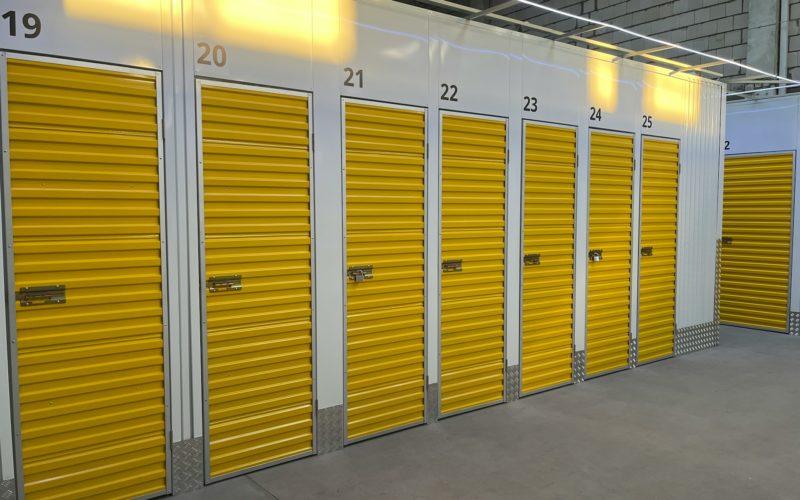Launching a self-storage business needs mindful planning and evaluation to ensure success in a competitive market. Key factors include selecting the right location, understanding local demand, and analyzing the competition, with self-storage software playing a key role in managing bookings, billing, and day-to-day operations. Additionally, securing financing, determining the optimal facility size, and developing a sturdy marketing strategy are essential.
According to GMI Research, self-storage requires temporarily renting out space for tenants. Self-storage services provide temporary space for people or businesses to keep their goods. They also provide locks, boxes, and other packaging materials. If you have a space of at least 5’x 5’, you can start your self-storage business. The global self-storage marketplace normally covers unit sizes starting from the lowest and reaching 10’x 5’, 10’x 10’, 15’x 10’ or more.
In this article, we will assess the costs, regulatory requirements, and customer service capabilities required to set up a profitable and sustainable self-storage business.
1. Market Research and Demand Analysis
Market research and demand analysis are essential steps in launching a successful business, especially in the self-storage industry. This process involves gathering data on local demographics, economic trends, and consumer behavior to identify potential customers and their storage needs. By analyzing competitors’ strengths and weaknesses, you can determine market saturation and uncover opportunities for differentiation.
According to Statista, online surveys were the most conventional quantitative method for market research. In a survey, 85% of the respondents revealed that they used online surveys as one of the three most useful methods for market research. Around 9% of respondents said that they used online surveys rarely.
According to Study Smarter, quantitative demand analysis refers to the assessments of demand for a product or service employing mathematical data and techniques. This demand analysis further assesses the area’s need for storage facilities, ensuring sufficient interest to sustain your business. Accurate research guides pricing and marketing strategies and helps in selecting the best location and services to meet customer expectations.
How do changing trends in consumer behavior impact demand for self-storage?
Changing trends in consumer behavior, urbanization, downsizing, and minimalism have led to a growing demand for self-storage solutions. As people seek more flexible living arrangements and declutter their homes, the need for accessible and secure storage options has risen. To meet this demand, finding the best storage facilities that offer reliable security, flexibility, and convenient access is crucial for individuals looking to store their belongings safely.
2. Location and Property Selection
Location and property selection are critical factors in the success of a self-storage business. Choosing a site with high visibility, easy access, and proximity to densely populated residential or commercial areas can significantly impact occupancy rates. It’s essential to consider the local competition and market demand to avoid oversaturation. The property’s size, layout, and zoning regulations also play a crucial role in determining the facility’s capacity and future potential.
Additionally, the safety and security of the area will influence customer trust and retention, making location and property selection vital to long-term profitability.
What are some common pitfalls to avoid when selecting a location for a self-storage business?
Common pitfalls to avoid when selecting a location for a self-storage business include choosing a site with low visibility or difficult access. Additionally, neglecting to research local market demand and competition can lead to oversaturation, making it harder to achieve desired occupancy rates. Ignoring zoning laws and potential future developments can also create legal and operational challenges.
3. Understanding Financial Requirements and Investment
According to Mordor Intelligence, the self-storage market size of the US is valued at around $44.33 billion in 2024. It is estimated to surge at a CAGR of 2.44% and become $50.01 billion by 2029. Globally, the self-storage market is also booming. However, to begin a self-storage business, it is vital to understand financial requirements and investment.
This process involves calculating initial costs, including land acquisition, construction, and permits, as well as ongoing expenses like utilities, insurance, and staffing. Securing financing, whether through loans, investors, or personal funds, requires a clear understanding of the capital needed to sustain the business.
Additionally, considering future investment for expansion or upgrades is important for long-term growth, making financial planning a foundational aspect of a successful self-storage venture.
4. Legal and Regulatory Compliance
Regulatory compliance is a vital aspect of operating a self-storage business, ensuring that the facility adheres to all local, state, and federal laws. Businesses must also stay informed about consumer protection laws and privacy regulations to safeguard customers’ rights.
Additionally, understanding landlord-tenant laws specific to self-storage, such as lien procedures for unpaid rent, is crucial to avoid legal disputes. Regularly reviewing and updating compliance practices helps mitigate risks, protect the business from potential lawsuits, and maintain a trustworthy reputation in the community.
5. Collaborating with Third-Party Self Storage Management Companies
Collaborating with 3rd-party self-storage management companies can be a strategic move for owners looking to streamline operations and maximize profitability. These companies bring expertise in areas like marketing, customer service, and facility maintenance, helping to optimize day-to-day management.
Copper Storage Management suggests hiring a third-party self-storage management company that can offer remote and hybrid services all across the nation. This can save time, capital, and other issues like daily activities and management. Hybrid companies also offer access to advanced technology platforms for managing bookings, payments, and security, enhancing the customer experience.
By leveraging their industry knowledge, third-party managers can improve occupancy rates and reduce operational costs. However, it’s essential to choose a reputable partner with a proven track record, as their performance directly impacts the business’s reputation and financial success.
What should be included in a management contract with a third-party company?
A management contract with a third-party company should clearly outline the scope of services provided, including responsibilities for marketing, operations, maintenance, and customer service. It should also specify the fee structure, performance metrics, and reporting requirements, along with terms for contract duration, termination, and dispute resolution.
6. Facility Design and Security Features
Facility design and security features are critical to the success and safety of a self-storage business. A well-planned layout maximizes space efficiency and accessibility, with clear signage and easy customer navigation. Incorporating advanced security measures, such as surveillance cameras, gated access, and individual alarms, protects stored items and boosts customer confidence.
For example, leading self-storage facilities typically offer diverse unit sizes, climate-controlled spaces, and 24/7 secure access systems, ensuring flexible options that meet varying customer needs. Such comprehensive amenities help attract and retain clients while maintaining competitive advantage in the market.
Adequate lighting and secure locking mechanisms further enhance safety. Additionally, climate-controlled units can attract clients with sensitive items, while robust fire and pest control systems safeguard against potential threats. Thoughtful design and comprehensive security features create a reliable, attractive facility that meets customer needs and regulatory standards.
7. Marketing and Customer Acquisition Strategies
Marketing and customer acquisition strategies are crucial for the success of a self-storage business, driving occupancy rates and revenue. Effective strategies include leveraging digital marketing, such as search engine optimization (SEO), pay-per-click (PPC) advertising, and social media campaigns to reach a broader audience.
Local marketing efforts, like community sponsorships and partnerships with moving companies, can attract nearby customers. Offering promotions, discounts, and referral programs incentivizes new sign-ups and customer loyalty.
Securing Success in Self-Storage
Launching a self-storage business requires careful planning in areas like location, financial investment, and facility design. By focusing on market research, legal compliance, and effective marketing strategies, you can create a profitable and secure operation that meets customer needs.












